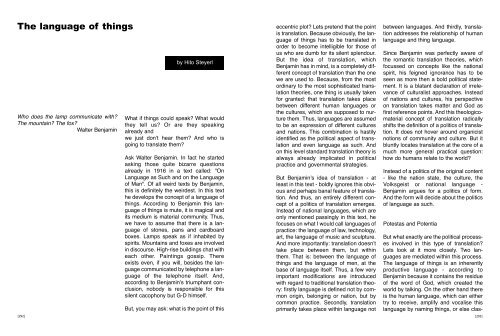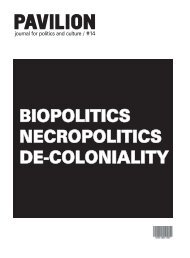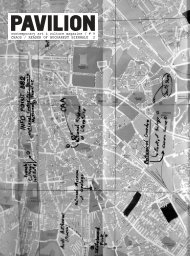PAVILION
PAVILION
PAVILION
- No tags were found...
Create successful ePaper yourself
Turn your PDF publications into a flip-book with our unique Google optimized e-Paper software.
The language of things<br />
Who does the lamp communicate with?<br />
The mountain? The fox?<br />
Walter Benjamin<br />
[292]<br />
by Hito Steyerl<br />
What if things could speak? What would<br />
they tell us? Or are they speaking<br />
already and<br />
we just don’t hear them? And who is<br />
going to translate them?<br />
Ask Walter Benjamin. In fact he started<br />
asking those quite bizarre questions<br />
already in 1916 in a text called: "On<br />
Language as Such and on the Language<br />
of Man". Of all weird texts by Benjamin,<br />
this is definitely the weirdest. In this text<br />
he develops the concept of a language of<br />
things. According to Benjamin this language<br />
of things is mute, it is magical and<br />
its medium is material community. Thus,<br />
we have to assume that there is a language<br />
of stones, pans and cardboard<br />
boxes. Lamps speak as if inhabited by<br />
spirits. Mountains and foxes are involved<br />
in discourse. High-rise buildings chat with<br />
each other. Paintings gossip. There<br />
exists even, if you will, besides the language<br />
communicated by telephone a language<br />
of the telephone itself. And,<br />
according to Benjamin’s triumphant conclusion,<br />
nobody is responsible for this<br />
silent cacophony but G-D himself.<br />
But, you may ask: what is the point of this<br />
eccentric plot? Lets pretend that the point<br />
is translation. Because obviously, the language<br />
of things has to be translated in<br />
order to become intelligible for those of<br />
us who are dumb for its silent splendour.<br />
But the idea of translation, which<br />
Benjamin has in mind, is a completely different<br />
concept of translation than the one<br />
we are used to. Because, from the most<br />
ordinary to the most sophisticated translation<br />
theories, one thing is usually taken<br />
for granted: that translation takes place<br />
between different human languages or<br />
the cultures, which are supposed to nurture<br />
them. Thus, languages are assumed<br />
to be an expression of different cultures<br />
and nations. This combination is hastily<br />
identified as the political aspect of translation<br />
and even language as such. And<br />
on this level standard translation theory is<br />
always already implicated in political<br />
practice and governmental strategies.<br />
But Benjamin’s idea of translation - at<br />
least in this text - boldly ignores this obvious<br />
and perhaps banal feature of translation.<br />
And thus, an entirely different concept<br />
of a politics of translation emerges.<br />
Instead of national languages, which are<br />
only mentioned passingly in this text, he<br />
focuses on what I would call languages of<br />
practice: the language of law, technology,<br />
art, the language of music and sculpture.<br />
And more importantly: translation doesn’t<br />
take place between them, but within<br />
them. That is: between the language of<br />
things and the language of men, at the<br />
base of language itself. Thus, a few very<br />
important modifications are introduced<br />
with regard to traditional translation theory:<br />
firstly language is defined not by common<br />
origin, belonging or nation, but by<br />
common practice. Secondly, translation<br />
primarily takes place within language not<br />
between languages. And thirdly, translation<br />
addresses the relationship of human<br />
language and thing language.<br />
Since Benjamin was perfectly aware of<br />
the romantic translation theories, which<br />
focussed on concepts like the national<br />
spirit, his feigned ignorance has to be<br />
seen as more then a bold political statement.<br />
It is a blatant declaration of irrelevance<br />
of culturalist approaches. Instead<br />
of nations and cultures, his perspective<br />
on translation takes matter and God as<br />
first reference points. And this theologicomaterial<br />
concept of translation radically<br />
shifts the definition of a politics of translation.<br />
It does not hover around organicist<br />
notions of community and culture. But it<br />
bluntly locates translation at the core of a<br />
much more general practical question:<br />
how do humans relate to the world?<br />
Instead of a politics of the original content<br />
- like the nation state, the culture, the<br />
Volksgeist or national language -<br />
Benjamin argues for a politics of form.<br />
And the form will decide about the politics<br />
of language as such.<br />
Potestas and Potentia<br />
But what exactly are the political processes<br />
involved in this type of translation?<br />
Lets look at it more closely. Two languages<br />
are mediated within this process.<br />
The language of things is an inherently<br />
productive language - according to<br />
Benjamin because it contains the residue<br />
of the word of God, which created the<br />
world by talking. On the other hand there<br />
is the human language, which can either<br />
try to receive, amplify and vocalise this<br />
language by naming things, or else clas-<br />
[293]








